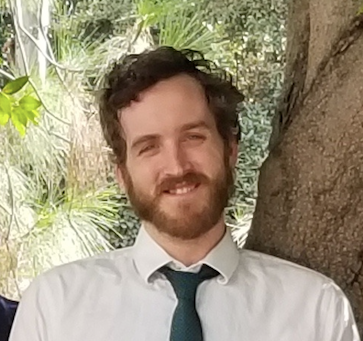[Image Description: Daniel Harmon smiling at the viewer.]
1. What did you get your degree in, and what are you doing now?
I received my PhD in Developmental Psychology and I am currently a research associate with the California Department of Justice, in the Social Justice unit of their Research Center.
2. What are the top 2-3 things you did while at UCR that helped you finish your degree (and get a position in your field, if you have)? What was most helpful to you as a student here?
The top 3 things I did (because I like the number 3) would have to be:
1) Find a good social support network. This is not related to any skill that I picked up in grad school, but was arguably the most important to my completion. A good social support network helps both professionally and emotionally. Professionally, I was able to collaborate with other scholars from various disciplines and perspectives that helped inform and improve the work that I did while at UCR. I do not believe a single study I published was done without at least some social support collaboration. This collaboration is also a really marketable skill too, people want to know you can and will work with others in and out of academia. Emotionally, the degree was tough. My qualifying exams and finishing my dissertation were all struggles and I might have given up without that social support. I initially told myself I wouldn't write a forward to my dissertation thanking all the people who helped me. If you look up my dissertation now, you can see that clearly changed.
[Image Description: Superman stands in with one fist raised as if he's about to take off and fly. Behind him stands Batman, who is holding up Superman's cape. Batman waves the cape so that it looks like it's blowing in the wind.]
Pictured: Collaboration at it's finest
2) Go out for competitions and opportunities that may be out of the ordinary. This is not to say get distracted by every side project, but rather, to expand your horizons outside of your tower. Once done, we will all (ideally) have PhDs that will show we have mastery in whatever field we've studied. Now, having 12 first-author publications is great too but we can't all be that good, ZANE! What can set us apart and round us out are engaging in activities that are supporting our degree but offer a different perspective or focus. Some of the things that helped me most and provided me the most useful skills for my non-academic job seeking were workshops I took. These workshops let me give certification or tangible proof of expertise in skills like marketing products, public outreach, speaking to professional and non-professional audiences. Also, go out for competitions. I could have done more of that. Even if you don't think you'll win, it is always better to try. Many competitions are for posters or presentations that you will probably be doing anyway so it is a low-cost high-reward situation.
3) Protect your time. This advice may seem contradictory to number 2, but it should be read as a cautionary supplement. As a grad student, you will have a flurry of opportunities and obligations. While it is great to take on those teaching jobs, join those workshops, and (hopefully) win those competitions, it can lead to stalling your degree progress. Grad students are motivated, hard working, and passionate - they would not have chosen the grad student life otherwise - but that leaves them open to over committing. My last, and the other arguably most valuable, advice is to guard your time like a dragon guards his/her/their hoard. You only have so much time, and should spend it only where it will have benefits for you. So maybe a better analogy is a dragon with a healthy stock portfolio who believes in generating wealth through community spending, but you get the idea. This is not to say don't help a friend or be a jerk. However, it becomes easy to say "yes" to every opportunity because you might be a genuinely caring person, maybe the opportunity sounds fun, or countless other reasons. Yet, I have met and seen too many fellow grad students crushed under the weight of too many projects to not caution you against over committing.
This advice is, unfortunately, in my experience more important for women grad students. I have seen many women in my department get loaded with more menial or secondary tasks that don't aid in developing their skills or their degree than their male counterparts. I can't say why this occurs (I mean other than sexism) nor have I done a study to examine the extent to which it happens. I only have my own experiences and the experiences told to me by the women with whom I worked to guide me. I just know that in my social support networks I was far more likely to see women loaded with these perfunctory tasks than men.
Most helpful as a student would have to be my advisor. She offered good solid advice (including the advice above!), strong and necessary critique, and support throughout my tenure at UCR. One of the first steps to success as a grad student is to find yourself a good, supportive, and open advisor.
[Image Description: Toothless, from How To Train Your Dragon, blinks as if considering something before his ears go back and he begins to growl.]
Pictured: You, protecting your healthy stock portfolio...I mean, your time
3. What did you like best about your graduate work? What did you like least?
Best: I found life long friends and got to do things that genuinely interested me. Not only that, but I had the freedom to mold my expertise (somewhat) and really develop into the person I became. I don't know of any other situation that offers that sort of ability for personal growth. Also, being in a cohort of similarly interested and passionate people led to forging deep friendships I still have to this day, some 13 months post-graduation. If I were being snarky, I would say the GradSuccess snacks were the best.
Worst: A tie between the hours and publishing studies! I spent many many hours in the lab and on the weekend running experiments or this and that. I highly prize my current work hours in my non-academic job. Nothing feels worse than working over 200 hours in a month on something and having the experiment not work out and thus be unpublishable. Speaking of publishing, the whole system from start to finish is certainly a circle of hell, though you'd have to ask a religious studies student which one. So, some secret extra advice, find out if you love publishing, as that can be an easy benchmark for whether or not academia is for you.
[Image Description: Awkwafina puts a potato chip in her mouth and tips her shoulder back, smirking while she chews.]
Pictured: The satisfaction of a good GradSuccess snack
4. Is there anything you wish you had done, or regret doing/not doing, while you were a UCR graduate student?
As before, not going out for more competitions is a regret. Grad students usually present posters or talks at conferences and there are usually poster/talk competitions. I never really did that because there was sometimes an extra page to write for submissions, but I wish I had hit that "enter" button more often. I won a free t-shirt from one, so it is definitely worth it.
5. What are you most looking forward to in your new position/post-graduate life?
Fewer hours, not having to publish articles unless I genuinely want to, and applying my skill set in the real world more. I am working for the California government and it is nice to use my research skills to have real, tangible, impacts immediately on the world.
[Image Description: Captin Flint, from Black Sails, stands behind the ship's wheel, blood coating the side of his face, while he shouts, "Brace for impact!"]
Pictured: You, preparing yourself for the feeling of knowing your skills are being put to good use
6. What advice do you have for other graduate students at UCR about finishing their degrees, going on the job market, or life in general?
About to finish your degree: You're so close. Afterward, give yourself the permission to breathe and take a (small) break. What you did was very difficult and you deserve a rest afterward.
Going on the job market: I can't help with academia - never did it and didn't want to. For non-academia though, don't forget the skills that you gathered as a general researcher. You have honed a great set of not just technical skills like hypothesis generation and experimentation, but time management, speaking, communication, and probably computer skills. One of my mentors said that recruiters look first and foremost for written and verbal communication skills, so highlight those. Also, list all the wins from those competitions you definitely entered (at my advice).
General: Work to live, don't live to work. There is so much you can do and so many experiences you can enjoy so go out and enjoy them. Whether it's traveling to new locations, reading interesting books, rolling dice and slaying dragons, watching films, or just enjoying a moment. Don't rush through life because there's not a whole lot afterward.
[Image Description: A tan pug puppy running across the grass. The camera shifts so that the face of another black pug puppy is visible. Both puppies look like they are smiling as they run.]
Pictured: You, enjoying life outside of your grad school obligations

